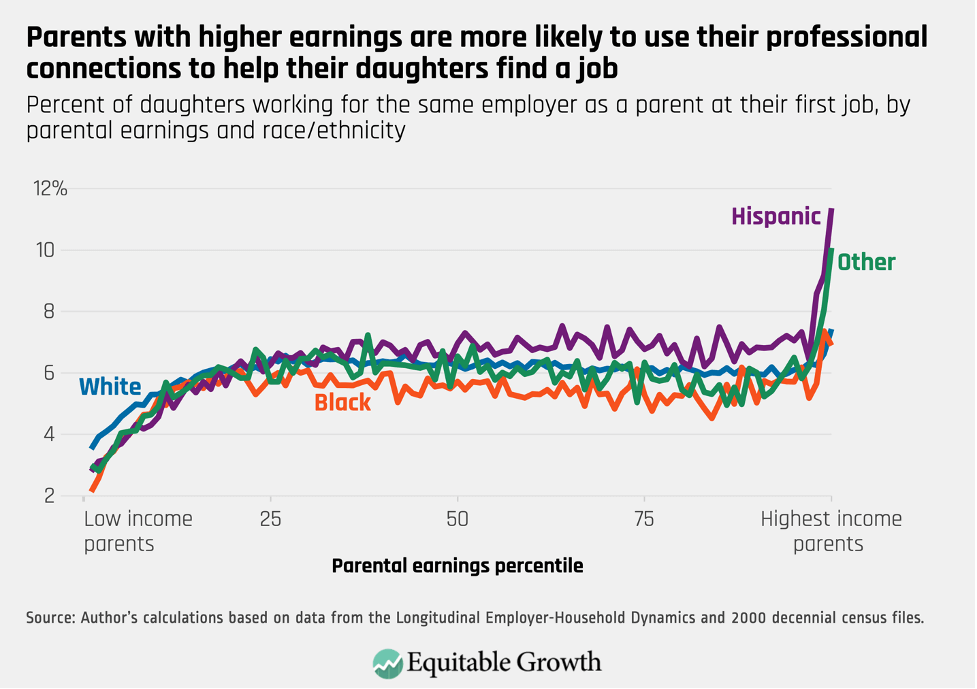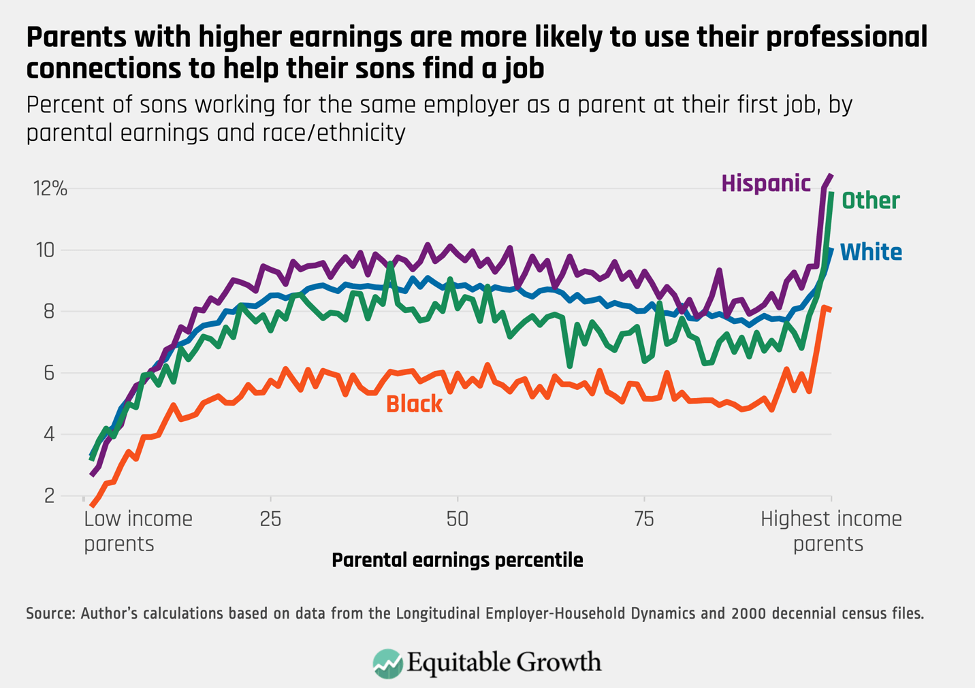https://equitablegrowth.org/in-the-united-states-its-not-what-you-know-but-who-your-parents-know/
In the United States, an individual's income tends to be closely related to their parents' income. This fact—that children born into poverty in this country are likely to remain in poverty as adults—runs counter to the American ideal of equality of opportunity. Furthermore, this pattern raises the concern that the U.S. economic system fails to provide all individuals with the opportunity to reach their full potential.
Individuals from disadvantaged backgrounds may earn less because they lack opportunities to develop skills that are rewarded in the U.S. labor market, or because structural barriers in the labor market prevent them from fully deploying their skills. The vast majority of research in economics focuses on the development channel, finding that families, neighborhoods, and schools all play an important role in shaping the development of skills. Yet an individual's income is not just determined by their skills ("what you know"), but also by the opportunities they have to deploy those skills in the marketplace.
Recent evidence suggests that the firm at which an individual is employed is also an important determinant of earnings. Furthermore, more than half of all jobs are found through a social contact, and thus, access to jobs at high-paying firms depends, in part, on who you know.
This is why parents also can affect how the skills of their children are deployed in the U.S. labor market, by using their connections to provide access to high-paying firms. In a recent working paper, "The Intergenerational Transmission of Employers and the Earnings of Young Workers," I study one way in which parents might do this by focusing on the connections that operate within the parent's current employer.
My paper has three main findings. First, it is not uncommon for an individual to work for a parent's employer. I study the experiences of 17 million young workers by linking survey data from the 2000 decennial census, which measures the relationship between parents and children, to administrative data from the Longitudinal Employer-Household Dynamics program, which measures the earnings of the individual, as well as characteristics of their employer. I find that 7 percent of individuals work for a parent's employer at their first job and 29 percent do so at some point between the ages of 18 and 30.
There are a number of explanations for why someone might work at the same firm as a parent. For example, parents and their children may tend to work for the same employer if there is a single employer that dominates the local labor market. However, individuals who work for a parent's employer are no more likely to work at large firms and tend to be located in urban areas. Rather, several pieces of evidence suggest that parents use their connections to help children who would have otherwise struggled to find a decent-paying job.
Figure 1 below presents the proportion of daughters who find their first job at the same employer as a parent, broken out by parental earnings and race/ethnicity. The estimates indicate that individuals with higher-earning parents are more likely to work for the employer of a parent, which could be attributable to the fact that parents with higher earnings are more likely to be employed and more likely to hold a position of authority within the firm. Figure 2 demonstrates that the same pattern is evident for sons.
Figure 1

Figure 2

Second, there are large earnings benefits associated with working for a parent's employer. Estimating the causal effect of working for a parent's employer is difficult because individuals who work for a parent's employer are likely different from those who do not. I address this concern by using an instrumental variables estimator that exploits exogenous variation in the availability of jobs at the parent's employer. Intuitively, some individuals will only find a job at their parent's employer when there are many job opportunities at that firm (the firm is hiring intensively).
My empirical strategy compares individuals who are looking for a job in times when their parent's employer is hiring intensively to individuals who are looking for a job in times when their parent's employer is not hiring intensively. This comparison provides a way of estimating the causal effect of working for a parent's employer since the only difference between the two groups (after controlling for differences across the parents' employers and local labor market conditions) is that one group is more likely to work for their parent's employer.
I find that working for a parent's employer increases an individual's initial earnings at a first job by 31 percent, and individuals with higher-earning parents experience a larger increase in earnings. By looking at the characteristics of the employers, I find compelling evidence that the individual-level earnings gains are explained by parents providing access to higher-paying firms. For example, parents provide access to jobs in construction, which tend to pay much better than jobs at fast-food restaurants. The earnings benefits persist for years after the individual starts their first job, suggesting that parents provide access to jobs that have higher starting wages and also offer better opportunities for career advancement.
Third, the close relationship between an individual's earnings and their parents' earnings is partly attributable to individuals with higher-earning parents being more likely to work for a parent's employer and benefit more when they do. The magnitude of the effect is modest—the association between an individual's earnings and their parents' earnings would be about 10 percent weaker if no one worked for the employer of a parent. But it is important to keep in mind that parents may have other connections through friends, classmates, or former co-workers.
In this way, my results raise the possibility that parental labor market networks (more broadly defined) are an important channel through which parents shape the earnings of their children. When cutting the results by race/ethnicity, sex, and parental earnings, I find that non-Black males with high-earning parents benefit more from working for a parent's employer than any other group, further exacerbating racial disparities in earnings.
Both within academic and policy spheres, the prevailing narrative surrounding economic opportunity focuses on the development of skills. Educational programs such as Head Start, which provides access to early childhood education, and the Pell Grant program, which helps low-income students and their families pay for college, are both examples of programs that promote the development of skills for individuals from disadvantaged backgrounds. Yet my results highlight that even with equal skills, individuals from disadvantaged backgrounds will tend to earn less because their parents are less able to use their connections to provide their children with access to high-paying jobs. This is just one example of how structural inequities in the U.S. labor market are an important channel through which equality of opportunity is undermined and why, therefore, a focus solely on improving education and skills is insufficient to ensuring true equality of opportunity.
These dynamics are particularly important in the current U.S. economic environment. I find that less-educated workers searching for jobs in periods of high unemployment are most likely to rely on parental connections. So, as policymakers begin to think about how to power the economic recovery from the current coronavirus recession, closing the skills gap is likely to be an insufficient solution to eliminating disparities in earnings across groups. Instead, education-focused policies should be combined with additional efforts that aim to directly address disparities in access to jobs—for example, programs that provide job guarantees or mentorship opportunities.
-- via my feedly newsfeed

No comments:
Post a Comment